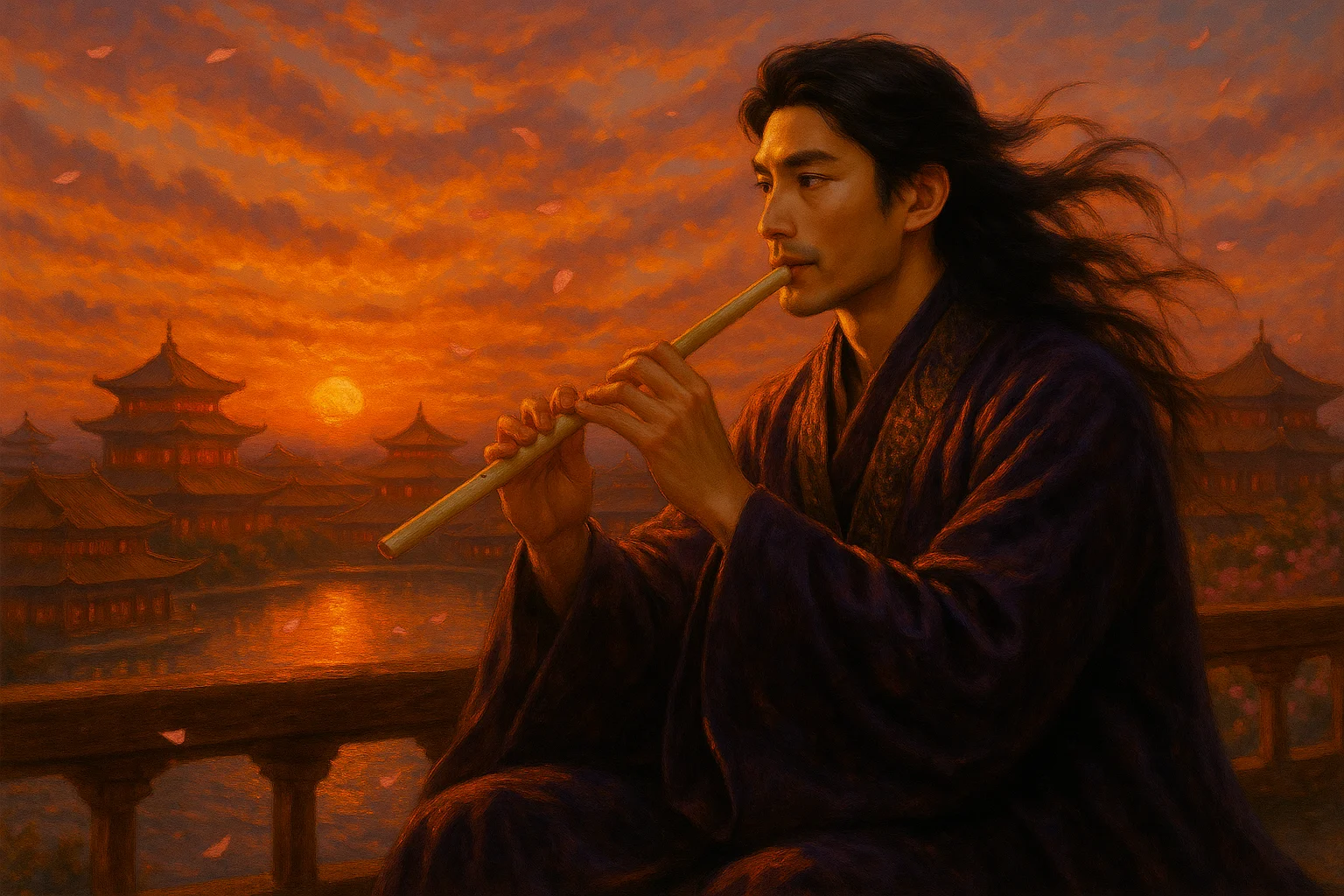Our life is short as fleeting years;
Parting for none appears
But racks the heart with tears.
Feast and song should never be declined
While we may drink our cups of wine!
The boundless hills and streams but feed my thirst
For the fair one I’ve lost in the world dispersed.
Flowers fall in wind and rain, spring’s on the wane.
Why not enjoy the beauty before your eyes
Instead of longing for the one beyond the skies?
Original Poem
「浣溪沙 · 一向年光有限身」
晏殊
一向年光有限身,等闲离别易销魂,酒筵歌席莫辞频。
满目山河空念远,落花风雨更伤春,不如怜取眼前人。
Interpretation
Included in Pearls and Jade Lyrics, this exceptional work by the statesman Yan Shu departs from his characteristic refined elegance, revealing instead profound existential contemplation. Written during Northern Song's mid-period, the lyric confronts life's transience with uncharacteristic emotional intensity, ultimately advocating for cherishing present connections over futile lamentation.
First Stanza: 一向年光有限身,等闲离别易销魂,酒筵歌席莫辞频。
Yī xiàng nián guāng yǒu xiàn shēn, děng xián lí bié yì xiāo hún, jiǔ yán gē xí mò cí pín.
This fleeting light our bounded form must greet—
Even casual partings pierce the soul complete.
Never decline
The frequent feast,
The brimming cup,
The song's repeat.
The stanza's three clauses form a logical progression: the opening axiom (有限身) establishes human mortality, the middle observation (易销魂) demonstrates emotional vulnerability, and the concluding imperative (莫辞频) proposes hedonistic consolation. The juxtaposition of "casual partings" (等闲离别) with "pierce the soul" (销魂) reveals Yan Shu's acute sensitivity to life's ordinary ruptures.
Second Stanza: 满目山河空念远,落花风雨更伤春,不如怜取眼前人。
Mǎn mù shān hé kōng niàn yuǎn, luò huā fēng yǔ gèng shāng chūn, bù rú lián qǔ yǎn qián rén.
Mountains and rivers stretching view—
Vain yearnings for the far and few.
Petals storm-tossed—
Spring's lament renewed.
Better instead
To cherish the present,
The proximate,
The here-and-now true.
The cosmic perspective (满目山河) contracts to immediate intimacy (眼前人), enacting the poem's philosophical movement from abstraction to application. The "storm-tossed petals" (落花风雨) become objective correlatives for both seasonal and human vulnerability, while the concluding counsel (怜取眼前人) anticipates modern existentialism's emphasis on present connection over metaphysical longing.
Holistic Appreciation
This lyric poem begins with sorrow yet does not wallow in it; instead, it shifts from the pain of parting to cherishing the joy before one’s eyes. The emotional arc moves from "grieving the passage of time" and "lamenting separation" to "mourning spring" and "longing for the distant," culminating in the admonition to "cherish those before you." The poem flows with measured cadence, its depth of feeling never descending into complaint. Yan Shu’s diction is refined, his emotions restrained, and his tone gentle yet imbued with quiet strength, revealing his lofty and magnanimous spirit.
Artistic Merits
- Lucid Language, Meticulous Diction: Yan Shu was renowned for his "clear phrases and beautiful lines," and though this poem carries profound emotion, it never loses its elegant refinement.
- Restrained Yet Profound Feeling: Though it speaks of separation and the sorrow of time’s passage, the tone avoids melancholy, instead achieving a deep, understated resonance.
- Exquisite Structure, Layered Progression: The first stanza moves from life’s brevity to seizing joy in the moment, while the second shifts from longing and springtime grief to treasuring the present—each transition smooth and natural.
- Grand, Suggestive Imagery: Elements like "mountains and rivers," "wind and rain," and "falling flowers" expand the spatial scope while deepening the poem’s philosophical undertones.
Insights
This poem teaches us: Life is fleeting, and the world is unpredictable. If we dwell only on regret and sorrow, we risk neglecting the people and moments before us. Though the poet grieves time’s haste and life’s many partings, his closing line urges us to return to reality and hold fast to the present. In an era of rapid rhythms and transient connections, the idea of "cherishing those before you" remains deeply relevant. It reminds us that rather than sighing over the past, we might find meaning and warmth in the people and experiences of the here and now.
About the Poet

Yan Shu (晏殊 991 – 1055) Originaire de Fuzhou dans le Jiangxi, Yan Shu fut le maître fondateur de l'école wanyue (élégante et retenue) de la poésie ci sous les Song du Nord. Enfant prodige entré dans l'administration à quatorze ans, ses ci allient noblesse classique et méditation philosophique dissimulée sous des évocations de prospérité raffinée. Mentor de talents comme Fan Zhongyan et Ouyang Xiu, il initia l'École du Jiangxi en poésie ci et posa les bases de l'épuration du genre sous les Song.












